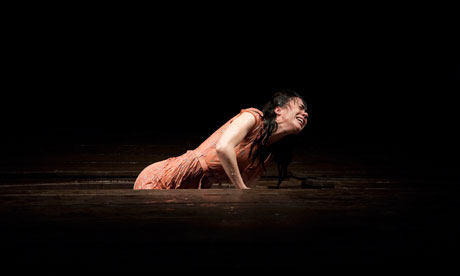PLAY REVIEW: YERMA at West Yorkshire Playhouse
Lorca described Yerma (1934) as "a tragic poem". Reflecting on issues of childlessness, the repression of women, and the nature of marriage, this new adaption by Irish writer Ursula Rani Sama sees his powerful play transplanted to Ireland. This is a setting which makes a lot of sense given the similarities between the two nations; a rigid Catholicism, a judgemental society with strict expectations of women, and a superstitious rural tradition of rituals and fertility rites.
Fascinating though these national parallels are, I did not find myself fully convinced by the Irish setting. The accents were of varying quality but acceptable. What jarred more for me was the nagging knowledge that Lorca is making comments on the restrictive society of his native Spain. Of course there are obvious affinities between the two countries, but I often found myself perplexed, not quite sure, for example, how to replace my imagination's expectations of arid, Spanish landscapes with a green, rain-soaked Ireland. Having recently seen Brian Friel’s Dancing at Lughnasa, with all its Irish pecularities, could go some way towards explaining my confusion, but the transition certainly diluted Lorca's characteristic emotional intensity.
Fascinating though these national parallels are, I did not find myself fully convinced by the Irish setting. The accents were of varying quality but acceptable. What jarred more for me was the nagging knowledge that Lorca is making comments on the restrictive society of his native Spain. Of course there are obvious affinities between the two countries, but I often found myself perplexed, not quite sure, for example, how to replace my imagination's expectations of arid, Spanish landscapes with a green, rain-soaked Ireland. Having recently seen Brian Friel’s Dancing at Lughnasa, with all its Irish pecularities, could go some way towards explaining my confusion, but the transition certainly diluted Lorca's characteristic emotional intensity.
This aside, Sama’s adaption does succeed in bringing out much of the lyricism and poetry of Lorca, an element that is difficult to transfer from the original. Particularly interesting was the enriching use of movement, compelling us to watch Yerma’s desparation wildly cavorting across the stage. Kate Stanley Brennan excelled as the lead, bringing a real intensity to the stage. The gaggle of women were also enjoyably convincing with their silly gossip, singing and washing foolery, and it was clear the school kids in the audience warmed to their saucy language. Director Roisin Brinn’s portrayal of the two sisters was starkly memorable, although somewhat spoilt by the laughter of the students. Sinisterly concealed entirely in long black capes and black beaked hats, they brought a clear contrast to the light, airy feel of the summery dresses of the rest of the cast, and the warm, bright lighting.
The set was particularly inspired; a simple tiered wooden decking which unexpectedly slid to reveal three pools of water for the washing scene. A huge tilting moon hung above the stage, reflecting the light from the pools, and lending an absurd, but magical quality to the performance. In domestic scenes Yerma’s house consisted of no more than a glowing line marking the boundaries on the ground, a powerful statement on the lack of privacy, the transparency imposed by rural Spanish culture. Equally powerful was the metaphorical image conjured in the second half of two chairs, one draped with Yerma’s scarf and the other with Juan’s jacket, separated by the lonely stretch of a huge table in an eloquent physical description of the growing distance between the couple.

No comments:
Post a Comment